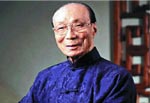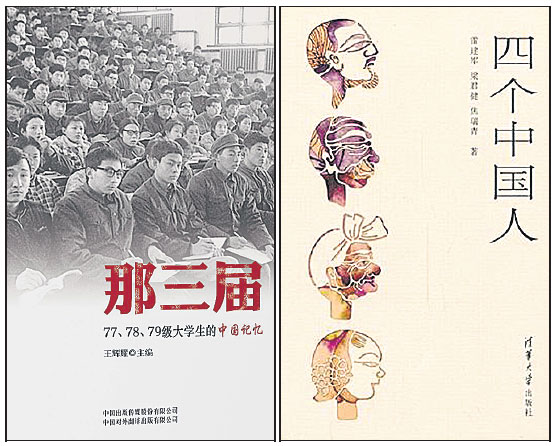History a hot topic for publishers
Updated: 2014-01-14 07:18
By Sun Ye and Mei Jia (China Daily)
|
||||||||
Memoirs about the lives of ordinary people were in abundant supply at the 2014 Beijing Book Fair.
Four Chinese, from Tsinghua University Press, follows the lives off our obscure craftsmen, who moonlight doing shadow plays or singing traditional funeral songs.
"They could be blue-collar workers by day, but they are also deeply committed to their own art," says Jiao Ruiqing, one of the book's authors from Tsinghua University. "It's not incongruous, it's how Chinese have always been for hundreds of years."
|
Many new books released at the Beijing Book Fair focus on the lives of ordinary people, like The Three Year Groups and Four Chinese. Photos Provided to China Daily |
Jiao filmed and lived with the unknown artists to witness "an entirely different lifestyle from what school has taught". Jiao's studio made the documentary in the hope of "redefining images of the Chinese".
Those Three Year Groups, by China Translation and Publishing Corporation, is a unique approach to the memoir and features essays from the classes of 1977, 1978 and 1979, and has thrown light on a fast-changing society.
Written by the first batch college students after the "cultural revolution" (1966-76), the essays trace their lives from the fate-changing entrance examination to today, when they emerge as the country's top scholars, businessmen and officials.
"We were especially lucky to get into college. And we worked so hard for it," says Li Zishi, who enrolled in Tsinghua University in1977.
Premier Li Keqiang entered Peking University the same year. "He was always reading, book in hand even when walking on the road," recalls Tao Jingzhou, one of his friends from university.
In science, Sichuan People's Publishing House presents Probing the Moon, a biography and scientific record featuring Ouyang Ziyuan, the country's chief scientist for the lunar probe project.
The book unveils the scientist's childhood, with detailed explanations on the history and progress of Chinese people's longing to better understand the moon.
Growing Up with Willie: How a Father Built a Colorful Life for His Autistic Son, published by Modern Press, focuses on Chinese-American David Zhuo-xi Peng's 15 years with his autistic child, and how he helped his son become independent and self-sufficient.
The book's author Huo Changhe spent five months living with the Peng family in the United States as part of his research. The book was warmly welcomed when launched at the book fair.
To mark the 35th anniversary of the reform and opening-up policy, the research center of the central committee of the Communist Party of China has put together An Oral History of the Reform and Opening Up by China Renmin University Press. The book details how various policies were developed and features 50 first-hand recollections.
Among the interviewees is Wan Li, former provincial secretary of Anhui province and a member of the Party's top leadership body. Wan recounts how reforms transformed rural areas. Tian Xueyuan, former head of the institute of population at the Chinese Academy of Social Sciences, recalls how the family planning policy came into being.
Celebrities' children have continued to release biographies. Mao Xinyu's new book about his mother Shao Hua, Mao Zedong's daughter-in-law, will be released in early January by the China Workers Publishing House.
In culture, Gao Peifen's Rhythmic Notation of Ancient Guqin Songs by Zhonghua Book Company, breaks new ground in the realm of guqin, the seven-stringed plucked instrument with a 4,000-year history but only 100 songs remaining in its repertoire. Because of the lack of proper modern music scores that tell the tempo and mode of playing, some 3,000 tunes are unheard today.
Gao, an representative inheritor of the guqin, has combed through massive amounts of material to re-discover 15 new tunes, some of which haven't been heard or played for 1,000years.
With properly marked tempo, style, artistic conception and inner spirit, Gao has revived the once-lost melodies.
"I've tried my best to resurrect the art form as it is," Gao says. "Now I feel they're getting back to the way they should be."
(China Daily 01/14/2014 page22)

 Gorgeous Liu Tao poses for COSMO magazine
Gorgeous Liu Tao poses for COSMO magazine
 Post-baby Duchess
Post-baby Duchess
 Victoria Beckham S/S 2014 presented during NYFW
Victoria Beckham S/S 2014 presented during NYFW
 'Despicable' minions upset Depp's 'Lone Ranger' at box office
'Despicable' minions upset Depp's 'Lone Ranger' at box office
 'Taken 2' grabs movie box office crown
'Taken 2' grabs movie box office crown
 Rihanna's 'Diamonds' tops UK pop chart
Rihanna's 'Diamonds' tops UK pop chart
 Fans get look at vintage Rolling Stones
Fans get look at vintage Rolling Stones
 Celebrities attend Power of Women event
Celebrities attend Power of Women event
Most Viewed
Editor's Picks

|

|

|

|

|

|
Today's Top News
Jackson's family bid for new trial denied
Newspapers must change or die
Abe’s brother to explain shrine visit to US
Protests cannot end Thai deadlock: observers
Mercy killing still a hot button issue
China builds army 'with peace in mind'
UN plea made on war victims
Li: China's tech innovation a priority
US Weekly

|

|








